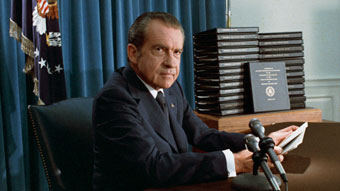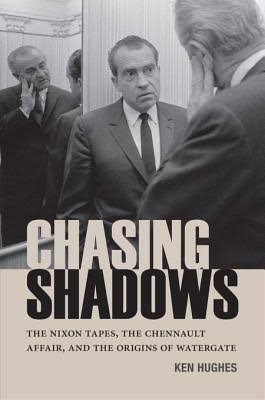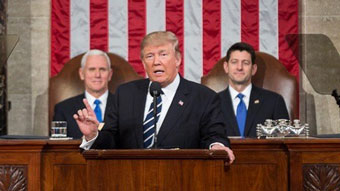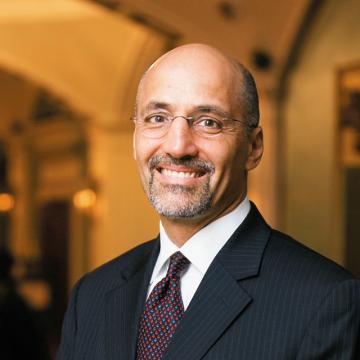From the Director: Presidents spying on presidents
Republican Senator Ben Sasse said it best: “We are in the midst of a civilization-warping crisis of public trust, and the president’s allegations today demand the thorough and dispassionate attention of serious patriots.”
He was responding to President Donald Trump’s accusation that former President Barack Obama wiretapped him directly. In the span of a week, Trump went from invoking Eisenhower and Lincoln in his address to Congress to conjuring McCarthy, Nixon, and Watergate.

Senator Sasse was judiciously vague about who broke the trust and where it was broken. His brief statement did, however, make clear that there is an important difference between legal and illegal surveillance. Legal surveillance requires an onerous process laid out either in the Foreign Intelligence Surveillance Act or in the federal criminal code. So if candidate Trump was the target of legal surveillance, that could be dangerous for President Trump. FISA demands a high standard of probable cause, based on suspected communications with foreign agents and direct threats to American security.
Even so, it would have been illegal for Obama himself (as opposed to his intelligence or law enforcement agencies) to have ordered such an act. As Frances Townsend, President George W. Bush’s homeland security advisor (and Miller Center Governing Council member) said on Monday: “… with the passage of FISA in 1978, I know of no president—including President Obama—that would have directly ordered the surveillance of an individual in the United States.”
We do not know whether direct surveillance of Trump or his team even took place, because Trump did not indicate what prompted his accusation.
Still, there is precedent for presidential surveillance. And there are lessons.
Is history a guide?
In fact, at least twice, a sitting president has been connected to surveillance operations on presidential candidates. Both cases involved Richard Nixon—one as a president, and the other as a candidate.

The most famous was the break-in of Democratic Party headquarters at the Watergate complex by the Nixon campaign, and the president’s complicity in the cover-up.
In the Watergate scandal, the motives were entirely political. Nixon himself did not order the break-in, but the team that did was doing so for purely political reasons: They were digging for dirt on political opponents in a simple yet toxic effort to win reelection. By seeking an extra (and illegal) advantage, that the president then attempted to cover up, they ended up bringing down Nixon’s presidency.
There is a second historical precedent: Candidate Nixon had been indirectly surveilled by the FBI. In the final weeks of the 1968 campaign, Nixon was working through Anna Chennault (a prominent GOP activist with connections throughout Asia, whom the FBI was tracking) to prevent the Paris peace talks between the North and South Vietnamese from beginning before Election Day. Nixon feared that if the talks began before the voting, then Lyndon Johnson’s vice president—Democratic candidate Hubert Humphrey—might win the election.

Thanks to FBI eavesdropping and diplomatic intelligence collected by the CIA and NSA, Johnson knew about Nixon’s subterfuge—as Miller Center scholar Ken Hughes has pointed out in his breathtaking book Chasing Shadows: the Nixon Tapes, the Chennault Affair, and the Origins of Watergate. Because Johnson believed that the peaceful transfer of power should go forward, he never criticized Nixon’s actions publicly, though he denounced them privately as treason.
There is a deeper irony, of course. We know about both Nixon transgressions because both Johnson and Nixon surveilled themselves. That is, by secretly recording their own White House conversations, Johnson and Nixon have given us a better sense of what each president knew, and when they knew it. Hughes’ Chasing Shadows is based on the deeply detailed transcriptions of the Nixon, Johnson, and Kennedy secret White House tapes—an ambitious Miller Center undertaking to unlock the secrets held in more than 4,000 hours of secret recordings.
What are the lessons?
Trump should take away at least three lessons from the two Nixon cases. And the public should take away a fourth.
Trump’s accusation is disruptively serious. The post-Watergate system is designed to prevent political use of surveillance, especially by a President. The intelligence agencies—principally the CIA, FBI, and NSA—believe deeply in the post-Watergate protections.
So, if in fact Trump himself was being surveilled, it is far more likely that the order came from one of the agencies. It is true that Obama appointed the directors of these various agencies—including FBI Director James Comey. It is also true that all of these agencies have been prone to leaks -- but not just about Trump and his campaign associates/ Leaks also extend to Obama and former Secretary of State Hillary Clinton. Direct involvement by President Obama (as opposed to his intelligence agencies) would exceed that in its seriousness.
As Senator Sasse said in his statement, Trump has the power to reveal any official information he has received. If the alleged tapping “was with a legal FISA court order, then an application for surveillance exists that the court found credible. The president should ask that this full application regarding surveillance of foreign operatives or operations be made available, ideally to the full public, and at a bare minimum to the U.S. Senate."
It is dangerous to be at war with your own government. Nixon held deep suspicion about leaks within the federal government. His suspicion contributed to his re-installation and expansion of the White House recording system, as well as his own inability to trust the federal agencies that, in theory, worked for him. At the end of the day, leaks from the FBI’s deputy director, Mark Felt, led to the Washington Post’s successful Watergate investigation.
The cover-up is often worse than the crime. This entire controversy began with concerns about Russian interference in the presidential election and possible collusion with Trump campaign officials. That latter allegation has not been proven. Still, incomplete or false statements by Trump administration officials about their conversations with Russian officials have led to the resignation of the president’s national security advisor and to the recusal of his attorney general from investigations into the matter. The president and his team should get out all of the facts in a fulsome manner: the truth, the whole truth, and nothing but the truth.
And the lesson for the public? We should stay engaged, keep an open mind, follow the facts.

Trump started last week on a high note, aiming to bring the country together in his address to Congress. Still, his popularity remains below 50 percent in most polls, and the single greatest thing he can do to score consistently above that mark is to work with both parties in Congress to get things done. The latest controversy makes that much harder.
By week’s end, he had returned to attacking others: Obama, the intelligence agencies, and then, incongruously, Arnold Schwarzenegger. Trump may be able to elevate his own standing above each of those other players. But unless Congress quickly follows his bidding and comes up with evidence vindicating Trump (and vilifying Obama), the president’s attacks are unlikely to help him advance his legislative agenda.
